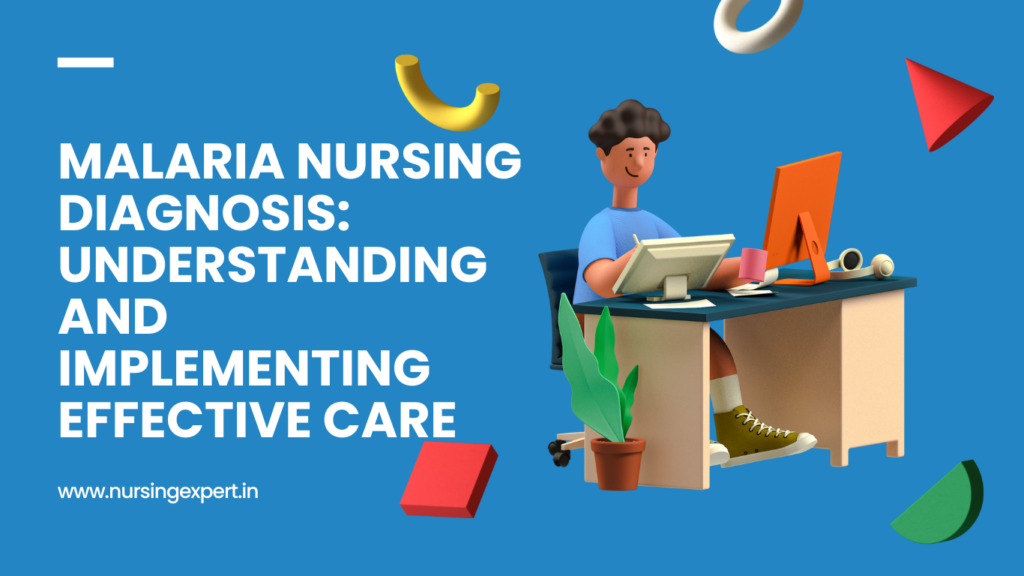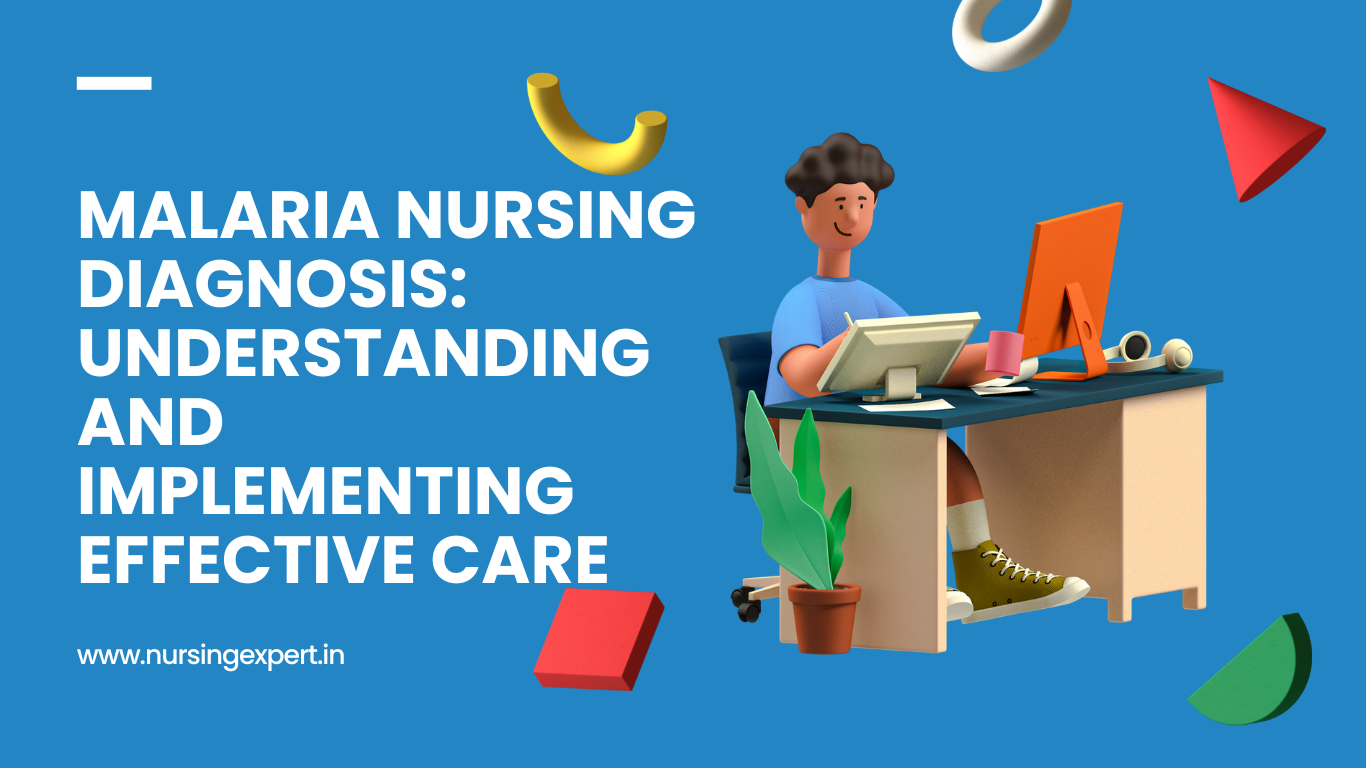Malaria Nursing Diagnosis is an essential aspect of managing and treating the disease effectively. The goal of malaria nursing diagnosis is to evaluate the patient’s health status, identify their health needs, and provide appropriate nursing interventions to meet those needs. By utilizing a patient-centered approach, nurses can play a vital role in reducing the burden of malaria and improving the health and well-being of affected individuals and communities. In this article, we will discuss the key components of malaria nursing diagnosis and the role of nurses in the management of malaria. With a comprehensive understanding of the importance of malaria nursing diagnosis, healthcare professionals can take effective steps to prevent, diagnose, and treat this debilitating disease.
Thank you for reading this post, don't forget to subscribe!

Malaria
Malaria is a widespread and life-threatening infectious disease caused by the parasite Plasmodium, which is transmitted to humans through the bite of infected mosquitoes. According to the World Health Organization (WHO), approximately 229 million cases of malaria occurred worldwide in 2019, resulting in 409,000 deaths, mostly among African children. The disease not only has a significant impact on human health but also imposes a heavy burden on healthcare systems and economies, especially in developing countries.
Effective malaria management requires prompt and accurate diagnosis, followed by appropriate treatment and patient education. As a crucial part of the healthcare team, nurses play a vital role in recognizing and addressing the various symptoms and complications of malaria, as well as in implementing effective nursing interventions to prevent its transmission and reduce its impact. In this article, we will discuss the importance of nursing diagnosis in the management of malaria and provide a comprehensive guide to its implementation.
Understanding the Concept of Nursing Diagnosis
Nursing diagnosis is a process of evaluating a patient’s health status, determining their health needs, and identifying appropriate nursing interventions to meet those needs. It is a critical component of nursing practice that enables nurses to provide individualized and patient-centered care, promote health and prevent disease, and ensure positive outcomes. Nursing diagnoses are based on a thorough assessment of the patient’s physical, psychological, and social status, as well as on the patient’s health history and clinical data.
Key Components of Malaria Nursing Diagnosis
The nursing diagnosis of malaria involves several key components, including:
- Assessment of the patient’s symptoms and signs, such as fever, headache, muscle pain, fatigue, chills, sweating, and anemia.
- Evaluation of the patient’s risk factors for malaria, such as travel history, exposure to infected mosquitoes, and previous exposure to malaria.
- Identification of the type of malaria parasite causing the infection, as well as the severity and stage of the disease.
- Determination of the patient’s underlying health conditions and co-morbidities, such as HIV, malnutrition, and pregnancy.
- Assessment of the patient’s understanding of the disease and its management, as well as their compliance with the treatment plan.
Common Nursing Diagnoses in Malaria Management
Based on the patient’s assessment and evaluation, the following are some of the most common nursing diagnoses in the management of malaria:
- Risk for infection related to exposure to infected mosquitoes.
- Altered comfort related to fever, headache, and muscle pain.
- Altered health maintenance related to lack of knowledge about malaria and its prevention.
- Altered nutrition: less than body requirements related to anorexia, nausea, and vomiting.
- Altered elimination related to dehydration and electrolyte imbalances.
Implementing Effective Nursing Interventions for Malaria
Nursing interventions for malaria management should be individualized and based on the patient’s specific needs and health status. Some of the most effective nursing interventions for malaria include:
- Education about the disease and its transmission, as well as about the importance of compliance with the treatment plan.
- Administration of appropriate anti-malarial medication, such as artemisinin-based combination therapies (ACTs), and monitoring of the patient’s response to the treatment.
- Assessment and management of the patient’s fluid and electrolyte balance, as well as of their hydration status.
- Encouragement of adequate nutrition and fluid intake, as well as the provision of dietary education
- to prevent malnutrition and anemia. 5. Promotion of hygiene measures to prevent the transmission of the disease, such as using insecticide-treated bed nets and practicing safe sex.
- Monitoring of the patient’s vital signs, such as temperature, blood pressure, and heart rate, to detect any signs of complications or adverse reactions to the treatment.
- Assessment and management of the patient’s psychological and emotional well-being, such as addressing any concerns or fears they may have about the disease and its impact on their health and life.
- Collaboration with other healthcare professionals, such as physicians, laboratory technicians, and pharmacists, to ensure a coordinated and comprehensive approach to the patient’s care.
- Conclusion
- Malaria is a serious and life-threatening disease that requires prompt and effective management to reduce its impact on human health and prevent its transmission. Nursing diagnosis is a crucial component of malaria management that enables nurses to provide individualized and patient-centered care, promote health and prevent disease, and ensure positive outcomes. By implementing effective nursing interventions, such as education, medication administration, fluid and electrolyte management, hygiene promotion, and psychological support, nurses can play a vital role in reducing the burden of malaria and improving the health and well-being of affected individuals and communities.
FAQs
Q1. What is malaria nursing diagnosis?
Malaria nursing diagnosis is the process of evaluating a patient’s health status, determining their health needs, and identifying appropriate nursing interventions to meet those needs in the management of malaria.
Q2. What are the key components of malaria nursing diagnosis?
The key components of malaria nursing diagnosis include assessment of the patient’s symptoms and signs, evaluation of their risk factors, identification of the type of parasite causing the infection, determination of underlying health conditions and co-morbidities, and assessment of their understanding of the disease and its management.
Q3. What are some common nursing diagnoses in malaria management?
Some common nursing diagnoses in malaria management include risk for infection, altered comfort, altered health maintenance, altered nutrition, and altered elimination.
Q4. What are some effective nursing interventions for malaria?
Some effective nursing interventions for malaria include education, administration of anti-malarial medication, fluid and electrolyte management, promotion of hygiene measures, monitoring of vital signs, and addressing the patient’s psychological and emotional well-being.
Q5. What is the role of nurses in the management of malaria?
The role of nurses in the management of malaria is to provide individualized and patient-centered care, promote health and prevent disease, and ensure positive outcomes by implementing effective nursing interventions, such as education, medication administration, fluid and electrolyte management, hygiene promotion, and psychological support.
Read More:



